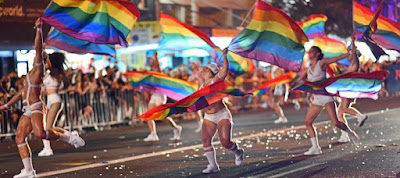The Excluder Excluded: What does it say about the state of identity politics in New Zealand and around the world that if Germaine Greer, the Matriarch of Second Wave Feminism, announced she was intending to participate in the Auckland Pride Parade, then Labour's Manurewa MP, Louisa Wall, would do everything in her power to exclude her?
WHAT DOES IT MEAN that Labour’s Louisa Wall would ban
Germaine Greer from the Auckland Pride Parade? What offence could the Matriarch
of Second Wave Feminism possibly have committed to merit Wall’s exclusion?
Greer’s “crime” is deceptively innocuous. She refuses to
abandon her opinion that human-beings come into this world as either women or
men, and that simply declaring oneself to be a man or a woman is insufficient
from an evidentiary perspective. Greer believes that gender is a matter of
straightforward human biology. That it cannot be an act of will – or surgery.
When BBC Newsnight’s Kirsty Walk challenged her with the
question: “If a man has his gender reassigned and outwardly – and he feels,
inwardly – he is a woman. In your view can he be a woman or not?” Greer
responded, with typical Australian bluntness: “No.” And when Walk observed
that, to some people, her reaction might be considered insulting, the
76-year-old scholar replied: “I don’t care. People get insulted all the time.
Australians get insulted every day of the week!”
That October 2015 interview contributed hugely to the steadily
worsening ideological stand-off responsible for introducing the abbreviation “TERF”
– Trans Exclusionary Radical Feminist – to the vocabulary of progressives
around the world. Including, we now know, Louisa Wall, who was secretly
recorded telling participants at a recent Pride Parade hui: “My whole thing is
that I don’t want any f...ing TERFs at the Pride Parade!”
Wall’s position would appear to be that in the name of inclusion
it is necessary to exclude the excluders. The Pride Parade, she says, must
never be anything less than a celebration of the whole Rainbow Community. To
challenge the right of trans individuals to define their own gender identity constitutes
a hateful denial of their human rights. In Wall’s opinion it is vital that
TERFs be prevented from disputing those rights.
Greer’s objection to the celebration of Male-to-Female
transformers is classic Second Wave Feminist. When BBC Newsnight’s Walk
confronted Greer with the example of Caitlyn Jenner, the former football hero
and medal-winning Olympic decathlete who later became a glamorous participant
in Keeping Up With The Kardashians,
she replied: “I think it’s misogynist. I think misogyny plays a really big part
in all of this. That a man who goes to these lengths will be a better woman
than someone who was just born a woman.”
Greer’s charge of misogyny goes to the heart of the
conflict. Here is the author of The
Female Eunuch, whose determination that women should embrace their
femaleness fully and fearlessly made her a feminist icon for the whole Baby
Boom Generation, rebelling angrily against the notion that gender is a fickle,
fluid concept. Greer simply will not accept that womanhood is no less a cultural
creation than a Versace gown – and just as easily knocked-off.
But, if gender is, indeed, a cultural artefact, then
maleness is every bit as artificial as femaleness. What’s more, in a world
dominated by aggressive and intolerant upholders of patriarchal values, the
covering which males are expected to fasten over and around their bodies
resembles much more a suit of medieval armour than it does a Versace gown.
What, therefore, could be more radical – more liberating –
than the idea that all those human-beings who feel uncomfortable, confined,
oppressed in their suit of armour can simply strip it off and throw it away?
Or, conversely, that all those human-beings who long for the reassurance of
iron and steel have every right to seek redemption in the armourer’s forge?
“Reject all binary choices!”, declare the singers of this
new freedom song. “We can become the people our hearts have always told us we were.”
The Marxists would wearily interject that they have been
here before. That human-beings become what the exigencies of existence require
them to be. Hunters/gatherers, warriors/wives, workers/homemakers. The
computers that define post-industrial societies may follow the logic of zeroes
and ones, but the civilisation they are rapidly bringing into existence will have less
to do with either/or dichotomies than any of the civilisations which preceded it.
Hitherto, the chief preoccupation of human communities has been with survival.
The new age which beckons to us from beyond the great test of climate change may
be preoccupied with becoming.
The conservative clings to what was and what works. The
radical reaches for what s/he yet may be.
This essay was
originally published in The Otago Daily Times and The Greymouth Star of Friday,
30 November 2018.















